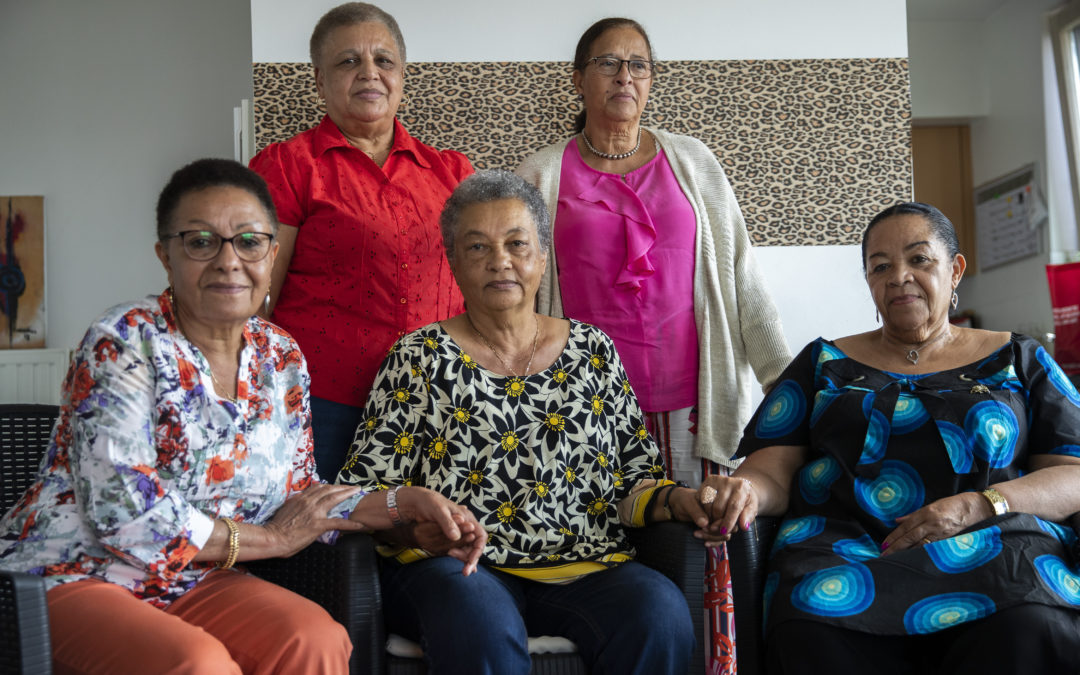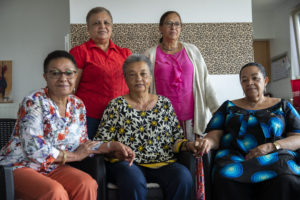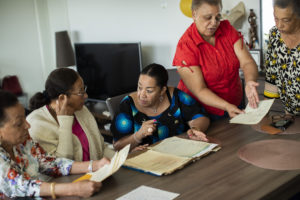
by Samuel Petrequin, Associated Press | Oct 20, 2021 | Headline News |

FILE – In this Monday, June 29, 2020 file photo, clockwise from top left, Simone Ngalula, Monique Bitu Bingi, Lea Tavares Mujinga, Noelle Verbeeken and Marie-Jose Loshi pose for a group photo during an interview with The Associated Press in Brussels. Five biracial women born in Congo when the country was under Belgian rule who were taken away from their Black mothers and separated from their African roots are suing the Belgian state for crimes against humanity. The case is being examined on hursday, Oct. 14, 2021 by a Brussels court. (AP Photo/Francisco Seco, File)
‘BRUSSELS (AP) — A court in Brussels has started considering a crimes against humanity lawsuit brought by five biracial women who were born in Congo and taken away from their Black mothers when they were little and the country was under Belgian colonial rule.
Lea Tavares Mujinga, Monique Bintu Bingi, Noelle Verbeken, Simone Ngalula and Marie-Jose Loshi are suing the Belgian state in hopes it will recognize its responsibility for the suffering of thousands of mixed-race children. Known as “metis,” the children were snatched away from families and placed in religious institutions and homes by Belgian authorities that ruled Congo from 1908 to 1960.
“My clients were abducted, abused, ignored, expelled from the world,” lawyer Michele Hirsch said Thursday as a court in the Belgian capital examined the civil case. “They are living proof of an unconfessed state crime, and soon there will be no one left to testify.”
The five women have requested compensation of 50,000 euros ($55,000) each.. The court is expected to deliver a verdict within six weeks.
The five women, all born between 1945 and 1950, filed their lawsuit last year amid growing demands for Belgium to reassess its colonial past.
In the wake of protests against racial inequality in the United States, several statues of former King Leopold II, who is blamed for the deaths of millions of Africans during Belgium’s colonial rule, have been vandalized in Belgium, and some have been removed.
In 2019, the Belgian government apologized for the state’s role in taking thousands of babies from their African mothers. And for the first time in the country’s history, a reigning king expressed regret last year for the violence carried out by the former colonial power.
Hirsch said Belgium’s actions are inadequate to what her clients experienced.
“The Belgian state did not have the courage to go all the way, to name the crime, because its responsibility incurred damages,” the lawyer said.. “Apologies for history, yes, but reparations to the victims, no.”
Lawyers say the five plaintiffs were all between the ages of 2 and 4 when they were taken away at the request of the Belgian colonial administration, in cooperation with local Catholic Church authorities.

FILE – In this Monday, June 29, 2020 file photo, from left, Marie-Jose Loshi, Monique Bitu Bingi, Lea Tavares Mujinga, Simone Ngalula and Noelle Verbeeken speak with each other as they as they look over papers during an interview with The Associated Press in Brussels. Five biracial women born in Congo when the country was under Belgian rule who were taken away from their Black mothers and separated from their African roots are suing the Belgian state for crimes against humanity. The case is being examined on hursday, Oct. 14, 2021 by a Brussels court. (AP Photo/Francisco Seco, File)
According to legal documents, in all five cases the fathers did not exercise parental authority, and the Belgian administration threatened the girls’ Congolese families with reprisals if they refused to let them go.
The children were placed at a religious mission in Katende, in the province of Kasai, with the Sisters of Saint Vincent de Paul. There, they lived with some 20 other mixed-race girls and Indigenous orphans in very hard conditions.
According to the lawyers, the Belgian state’s strategy was aimed at preventing interracial unions and isolating métis children, known as the “children of shame,” to make sure they would not claim a link with Belgium later in their lives.
Legal documents claim the children were abandoned by both the state and the church after Congo gained independence, and that some of them were sexually molested by militia fighters.
“If they are fighting for this crime to be recognized, it is for their children, their grandchildren. Because the trauma is transmitted from generation to generation,” Hirsch said Thursday. “We ask you to name the crime and to condemn the Belgian state.”
by Catherine Newhouse | Dec 14, 2011 | Feature, Headline News |

REMEMBERING THE TRAGEDY: A Rwandan genocide survivor visits the Gisozi memorial in Kigali, Rwanda, where he views pictures of some of the 800,000 people killed in his nation's 1994 massacre. (Photo: Radu Sigheti/Newscom)
When I studied abroad in Rwanda in July, friends and family expressed concern for my safety. To them, Rwanda conjured images of genocide that tore through this small African country in 1994.
Now, after learning about what happened during the genocide, their concern seems terribly ironic. Because if anything like the genocide were to happen again, my American passport would have gotten me a seat on the next plane home. I never would have been in any danger.
But I can’t say the same for the people I met in Rwanda: fellow students I took classes with, pastors I interviewed, street children I gave food to, and the leaders and scholars who lectured for our class. People who were like me, sharing my passion for ministry or my hope to make a difference, but without the American passport.
When the Rwandan genocide began in April 1994, Americans and other Westerners were immediately evacuated, while the most vulnerable people—the Tutsi being targeted, and the Hutu moderates who stood up for them—were abandoned.
The international forces that poured in to evacuate foreigners could have stopped the genocide right then if they’d teamed up with UN peacekeepers and other nearby troops. But they didn’t. And 100 days later, a million people were dead.
Seventeen years after the genocide, Rwanda is now one of the safest countries in Africa. But in other parts of the world still experiencing conflict, this scenario is not so far from the horrifying truth of what could happen when crisis hits: foreigners are saved, and Africans are not.In Rwanda, the killers were sharpening their machetes and waiting for the evacuation team to do their job, so they could close in on their victims without interference. The message to Rwandans was disturbingly clear: you were only getting on a UN rescue truck if you had that passport—or, in plainer words, if your skin was white.
“Mass slaughter was happening, and suddenly there in Kigali we had the forces we needed to contain it, and maybe even stop it,” UN General Romeo Dallaire told journalist Samantha Power in The Atlantic’s “Bystanders to Genocide.” “Yet they picked up their people and turned and walked away.”

ABANDONING RWANDA: The extremist Hutu militia killed 10 Belgian soldiers at this site to scare Belgium out of Rwanda. Belgium pulled its soldiers from the UN peacekeeping mission, severely reducing its force. The bullet holes are still visible at this former military camp, now a memorial in Kigali. (Photo by Tyler Hutcherson)
You can’t help but ask the difficult questions: Why were foreigners saved and Africans abandoned, when their lives are just as valuable? Why didn’t the rest of the world pull their troops together to save a million lives, rather than just rescuing the Westerners, calling the mission a success, and getting out?
I think of watching Beyond the Gates, a fictional movie about the Rwandan genocide, and listening to a white journalist compare her experiences seeing death in different countries. “When I was in Bosnia, I cried every day,” this character said. “I looked at the white faces of women dead in the gutter and thought, ‘That could be my mother.’ In Rwanda, I look at the bodies and I think, ‘It’s just dead Africans.’”
Looking back at what happened in Rwanda, I can’t help but wonder if a similar lack of empathy enabled the rest of the world to turn its back on Rwanda, reasoning that the people they left behind after the evacuation were “just dead Africans.” Has American culture become so numb to the suffering of Africans that it sees their continent as a lost cause? How can we help Americans see Africans as brothers and sisters in Christ, people who could be our family?
As I left the genocide memorials, I often felt empty, dead inside. I wasn’t sure I was capable of feeling even a fragment of the horror that happened there—let alone put it into words. Because there are some things that can’t be put into words, that are so mind-blowing that to even begin to describe them would be to trivialize the truth.
In such moments, it can be tempting to shut down emotionally, because although we may feel empathy, it seems that there’s not much we can do to put it to use. And so it’s all too easy to discard it, and move on.
I wonder what would happen if we instead clung to our empathy, aching and trusting that God can understand even when we have no words and don’t know what to do. As Romans 8:26 puts it, “We do not know what we ought to pray for, but the Spirit himself intercedes for us with groans that words cannot express.”
Because if we hold on to our empathy and cry out to God when we feel helpless, maybe we won’t give up so easily. Maybe we’ll open our eyes and see that a million lives could be saved. And then maybe we’ll use our voice as a church to do something about it.
CONFLICTS IN AFRICA TODAY:
• South Sudan’s foreign minister is warning that Sudan and South Sudan are “on the brink of war” after border violence, and the UN said Tuesday the fighting has displaced about 417,000 people. “If that conflict explodes, it would easily become the largest conventional war on the face of the earth,” wrote George Clooney and John Prendergast in a TIME article about famine as a weapon in Sudan.
• In Somalia, 250,000 people are still facing famine. The Islamist militant group Al-Shabaab has worsened the crisis, recently ordering 16 humanitarian aid agencies to leave Somalia, including the World Health Organization and UNICEF. The New York Times has disturbing photographs of the crisis—and one glimpse of hope, a photograph of one child giving another child a drink.
What’s the duty of the American church now? Is your church taking action to help stop violence and famine in Africa?





